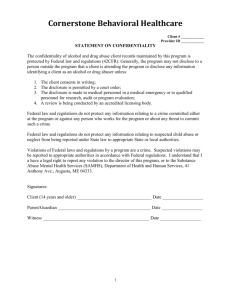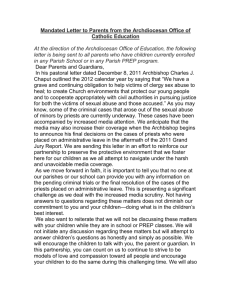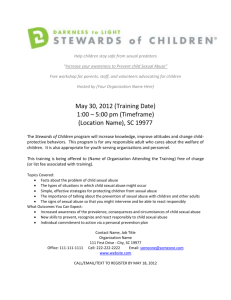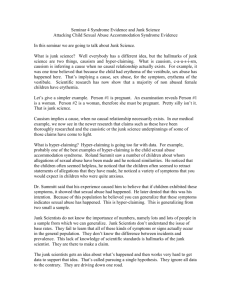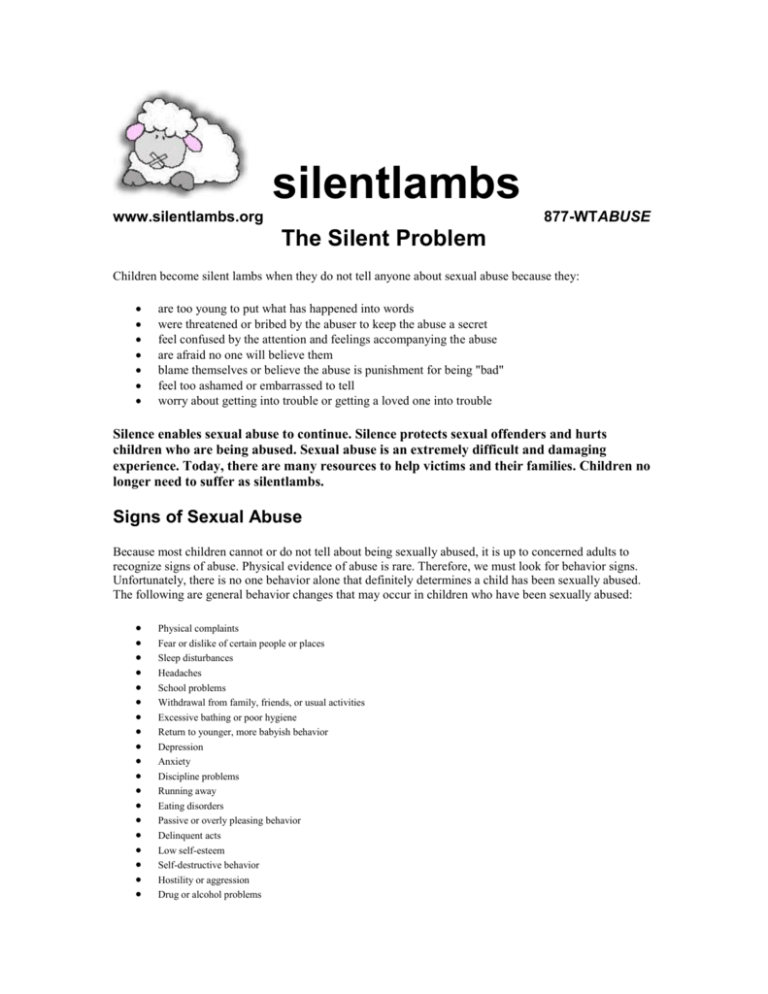
silentlambs
www.silentlambs.org
877-WTABUSE
The Silent Problem
Children become silent lambs when they do not tell anyone about sexual abuse because they:
are too young to put what has happened into words
were threatened or bribed by the abuser to keep the abuse a secret
feel confused by the attention and feelings accompanying the abuse
are afraid no one will believe them
blame themselves or believe the abuse is punishment for being "bad"
feel too ashamed or embarrassed to tell
worry about getting into trouble or getting a loved one into trouble
Silence enables sexual abuse to continue. Silence protects sexual offenders and hurts
children who are being abused. Sexual abuse is an extremely difficult and damaging
experience. Today, there are many resources to help victims and their families. Children no
longer need to suffer as silentlambs.
Signs of Sexual Abuse
Because most children cannot or do not tell about being sexually abused, it is up to concerned adults to
recognize signs of abuse. Physical evidence of abuse is rare. Therefore, we must look for behavior signs.
Unfortunately, there is no one behavior alone that definitely determines a child has been sexually abused.
The following are general behavior changes that may occur in children who have been sexually abused:
Physical complaints
Fear or dislike of certain people or places
Sleep disturbances
Headaches
School problems
Withdrawal from family, friends, or usual activities
Excessive bathing or poor hygiene
Return to younger, more babyish behavior
Depression
Anxiety
Discipline problems
Running away
Eating disorders
Passive or overly pleasing behavior
Delinquent acts
Low self-esteem
Self-destructive behavior
Hostility or aggression
Drug or alcohol problems
Suicide attempts
Specific Symptoms
Children who have been sexually abused frequently have specific symptoms:
Copying adult sexual behavior
Persistent sexual play with other children, themselves, toys or pets
Displaying sexual knowledge, through language or behavior, that is beyond what is normal for their age
Unexplained pain, swelling, bleeding or irritation of the mouth, genital or anal area; urinary infections; sexually transmitted
diseases
Hints, indirect comments or statements about the abuse
If Your Child Becomes a Victim of Crime
Believe him or her. Many children who tell adults about crimes are afraid they will not be believed. Many
aren't. Be sure to take your child seriously, even if a violent crime was not committed.
Reassure the child that what happened is not his or her fault. A child who was hurt or accosted while
breaking a rule (such as being somewhere you said they were not allowed to go) may be especially afraid
that you will be upset with him or her.
Immediately get him or her any needed medical attention. In the case of a sexual assault, an injury might
not be obvious, and a medical exam is needed to detect internal injuries and screen for possible exposure to
disease or infection.
Try to temper your own reaction. Your child is likely to become very upset if she or he sees that you are
upset. They may also think that they did something wrong and take responsibility for your pain. They may
decide it is better not to keep talking to you if you exhibit extreme emotions.
Trying to pretend something didn't happen or telling your child to "just forget about it" will not help. Both
you and your child will experience stress related to the crime, whether or not you acknowledge it. The best
way to cope with the problem is to talk, listen and get support.
Do not try to take the law into your hands. Your child needs you, and needs to try to get back some
normalcy in his or her life. If you try to harm someone who has hurt your child, you could be arrested and
even go to jail. Your child must then cope with this added trauma.
Report the crime -- even a suspected crime -- to the police.
Get support. Contact a local crime victim agency or child advocacy center. They can offer you and your
child support and important information about your rights. Don't try to handle this alone. There are many
organizations that can help you.
Your local phone book, law enforcement agency, or hospital can help you find local services. Or you can
call the National Center for Victims of Crime's FYI program, a toll-free crime victim referral service at 1800-FYI-CALL OR RAINN (Rape, Abuse, Incest, National Network) 1-800-656-HOPE.
Teach Your Child
1.
2.
3.
4.
5.
6.
Talk to your child on a daily basis and listen to what they are saying.
Teach your child about good and bad touches.
Teach your child names for the different parts of their body.
Teach them that no one is to touch their private areas or do anything that makes them feel
uncomfortable.
Without scaring your child, tell them that some adults might try to touch them in an inappropriate
manner, even adults they might know.
Tell them that they should not keep secrets from their parents, even if someone has threatened to harm
them or their parents.
Beware of over-zealous identification. If several signs are present do not question your child or
ask leading questions .Contact a professional (ie: therapists or MASA @ 704-895-0489 ).





